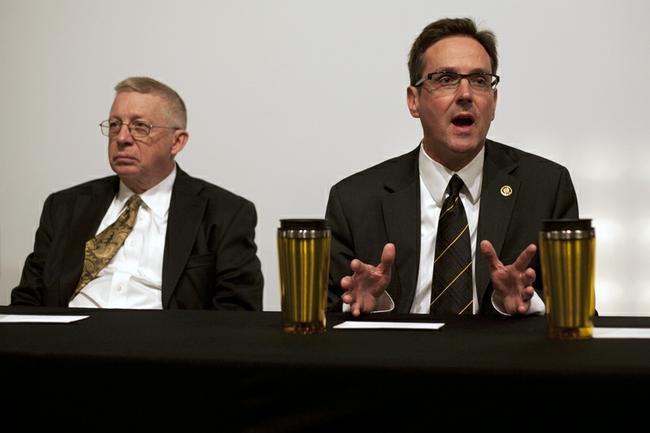Missouri state legislators spoke about higher education funding cuts and students’ civic engagement at a panel Thursday night.
The Associated Students of the University of Missouri and the Missouri Students Association sponsored the More For Less panel. About 60 students and community members attended the event.
Sen. Kurt Schaefer, R-District 19, Rep. Chris Kelly, D-District 24, and Rep. Stephen Webber, D-District 23, answered questions about higher education funding cuts for the 2013 fiscal year.
Kelly said although the 2013 Missouri budget was proposed without Gov. Jay Nixon’s original 12.5 percent in proposed cuts to higher education, the budget will not account for inflation or improvements.
“The University of Missouri will only slip back a little way,” he said. “It’s not going to get better.”
All three legislators talked about how it is important for students to be involved in the legislative process.
“It is easy for politicians to cut from higher education because you get the least amount of kickbacks,” Schafer said. Schafer is the Senate Appropriations Committee Chairman.
He explained that in the Missouri state budget, only about $7.5 billion is designated for discretionary use. He said money is primarily allocated to Medicaid programs, prisons and public education.
In recent years, Schafer said higher education had been hit particularly hard.
“You’ve just got to draw the line,” he said to students. “You’ve got to make sure your voices are heard.”
Schaefer said he expects other parts of the budget to see cuts in the near future.
“Some other things that have not paid their dues to date are going to have to pay their dues,” he said.
Weber said the reason higher education has been a target for budget cuts around the nation is the changing attitude in the U.S. about education.
“We have decided in this country that K-12 is on society,” he said, in reference to societal responsibility.
Weber said state governments have been paying less for public higher education in the past 20 years and placing more of the burden onto students. He said most of this is due to a reluctance to raise taxes.
“Your parents are asking you to pay more than they were asked to pay,” Weber said.
Kelly, who was first elected in 1982, said Ellis Library was one of the largest libraries in the world when he took office. Today, it is not even in the top 100.
“We are failing to fund this institution,” he said.
Kelly said in order to stay competitive with the rest of the world, states need to fund higher education institutions, particularly in the areas of math and science.
The legislators said it was crucial for students to participate in the legislative process.
“If students were to participate at one-fourth of their potential, they’d own three wards in the city of Columbia,” Kelly said.
Kelly said although it is important for students to be seen and heard in Jefferson City, they also need to participate in the political process.
“The important thing is will you deliver on election day,” Kelly said.
MSA and ASUM are sponsoring a march to Jefferson City on April 26 to show support for protecting higher education funding.








